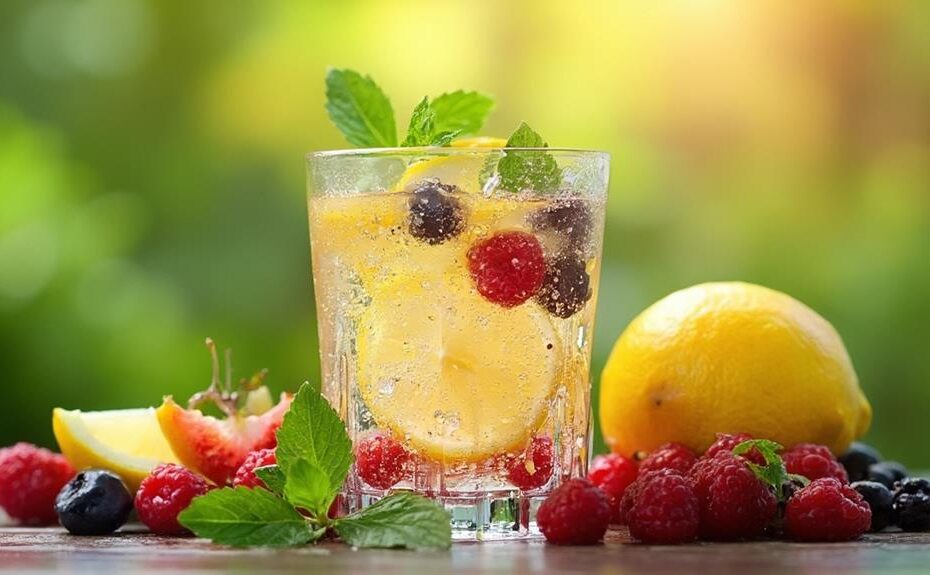Drinking enough water is crucial for maintaining good health. It boosts physical performance, sharpens cognitive function, and enhances mood. To stay hydrated, aim to drink at least eight cups (64 ounces) of water daily, adjusting the amount based on your activity level and climate.
For example, athletes or individuals living in hot and humid environments may need to drink more water to compensate for lost fluids.
Dehydration can have negative effects on the body. Signs of dehydration include thirst, dark urine, and fatigue. Even mild dehydration can impair your ability to think clearly and perform well.
To avoid dehydration, incorporate healthy beverages like herbal teas and smoothies into your daily routine. These beverages not only contribute to your daily water intake but also provide essential nutrients and antioxidants.
Tracking your water intake is essential. Keep a reusable water bottle handy and monitor your daily consumption to ensure you are meeting your hydration goals.
By prioritizing hydration, you can transform your overall well-being and experience the benefits of healthy beverage choices.
The Role of Water in Health
Water is essential for overall health, and staying hydrated can enhance physical performance, cognitive function, and mood. Staying properly hydrated allows your body to efficiently regulate temperature, lubricate joints, and aid digestion.
It also helps transport nutrients and oxygen to your cells, ensuring that your body operates at its best.
Proper hydration is critical for physical abilities. Even mild dehydration can negatively impact physical performance. If you're exercising or spending time in hot conditions, you'll need to increase your water intake to compensate for fluid loss through sweat.
Hydration directly affects brain function. Studies suggest that adequate water consumption can improve attention, memory, and overall mental clarity.
Additionally, drinking water can support your mood, with some evidence showing that being well-hydrated can reduce feelings of fatigue and anxiety.
To stay hydrated, aim for at least eight 8-ounce glasses of water daily, but you may need more depending on your activity level and climate.
Incorporating water-rich foods like fruits and vegetables can also contribute to your hydration goals.
Signs of Dehydration
Dehydration Signs and Symptoms
When your body lacks sufficient fluids, it sends out clear signals indicating dehydration. Thirst is the first sign, signaling your body's need for water. This can be accompanied by a dry mouth or a sticky feeling in the throat, making swallowing uncomfortable.
Physical activities, such as traditional Philippine folk dances, increase the need for hydration. Drinking enough water before and after participation is essential to maintain cardiovascular health.
Urine color is a key indicator of hydration: dark yellow or amber urine signifies dehydration, while light-colored urine indicates proper hydration.
Fatigue is another critical sign, as unusual tiredness or lethargy may be due to insufficient fluid intake.
Headaches can occur as the brain temporarily contracts from fluid loss, leading to discomfort.
Dizziness or lightheadedness, especially when standing up, are further warnings that you need to hydrate.
In extreme cases, dehydration can lead to more severe symptoms like confusion or rapid heartbeat.
Staying alert to these signs allows you to take proactive steps to drink more water and maintain your health.
Don't wait until you're feeling unwell; hydrate regularly.
Daily Water Intake Recommendations
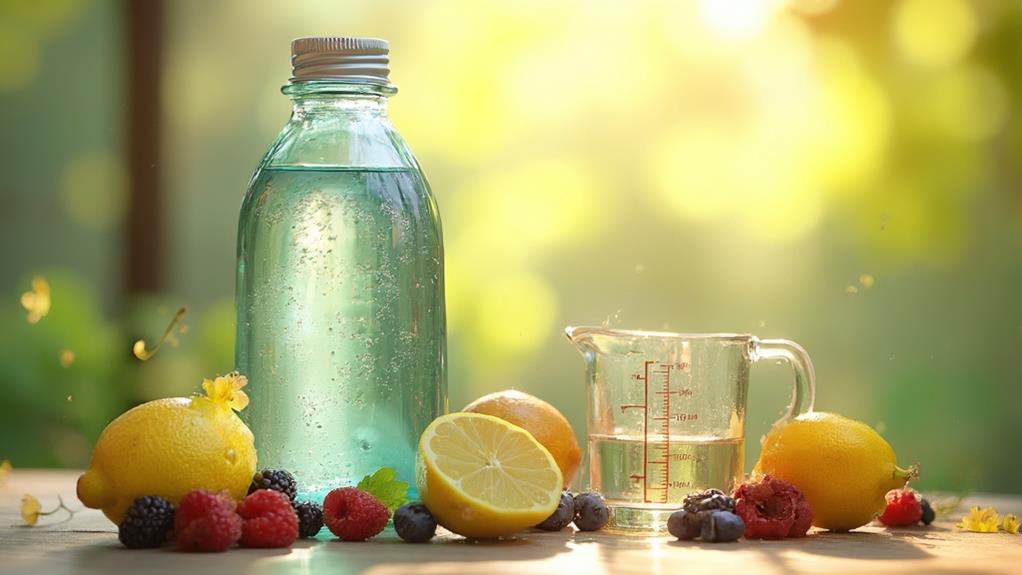
Daily Water Intake Recommendations
Understanding Your Water Needs
The general guideline is to aim for about 8 cups, or 2 liters, of water per day. However, individual needs can vary based on factors like age, sex, activity level, and climate.
Factors Affecting Water Needs
Men typically require about 3.7 liters (or 13 cups) a day, while women need about 2.7 liters (or 9 cups).
If you're physically active or live in a hot climate, you'll need more to compensate for fluid loss through sweat.
Practical Approach to Hydration
Drink when you feel thirsty, and pay attention to the color of your urine; pale yellow is a good sign of hydration, while darker shades indicate a need for more fluids.
Additional Sources of Hydration
Other beverages and foods contribute to your daily intake, too. Herbal teas, milk, and fruits like watermelon can help you stay hydrated.
Optimal Hydration
By being mindful of your water intake and adjusting according to your lifestyle, you'll keep your body functioning optimally.
Benefits of Drinking Water
Drinking Water is Crucial for Overall Health
Drinking water regularly offers numerous benefits that can significantly enhance your overall health.
Staying hydrated helps maintain your body's fluid balance, which is crucial for functions like digestion, circulation, and temperature regulation.
Supporting Kidney Function
When you drink enough water, you're also supporting your kidneys, allowing them to efficiently remove waste and toxins from your body.
Optimizing Physical Performance
Water plays a vital role in optimizing physical performance.
Proper hydration can prevent fatigue and improve endurance. By drinking water before, during, and after workouts, you'll enhance recovery and reduce the risk of injury.
Boosting Cognitive Function
Adequate water intake can boost your cognitive function.
Studies show that even mild dehydration can impair concentration, alertness, and short-term memory.
Drinking water regularly helps you stay sharp and focused throughout your day.
Assisting in Weight Management
Water can assist in weight management.
Drinking water can help you feel full, reducing the chances of overeating.
Incorporating water into your daily routine is a simple and effective way to unlock these benefits and promote your overall well-being.
Healthy Beverage Options
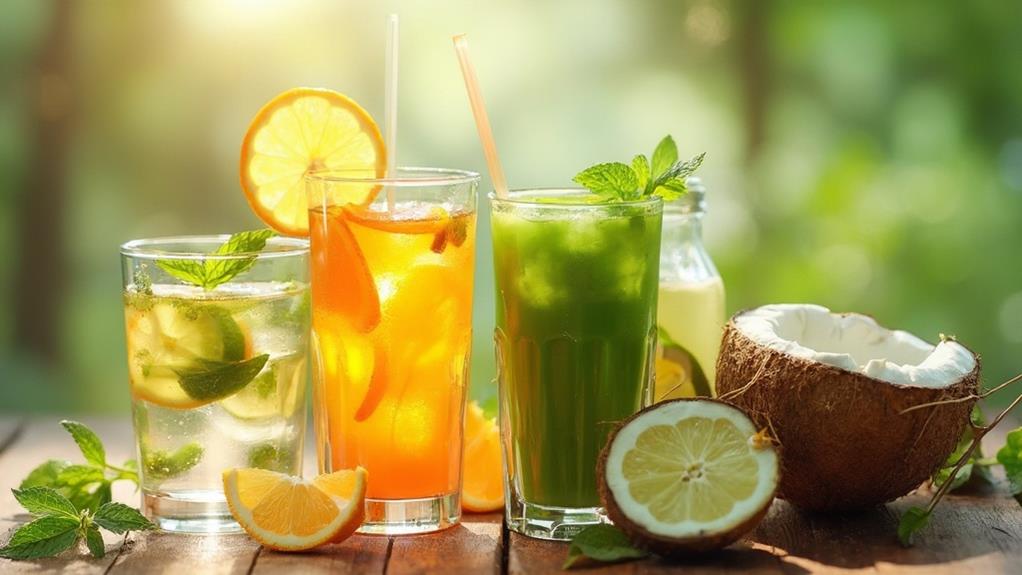
While staying hydrated with water is essential, incorporating other healthy beverage options can enhance fluid intake and provide additional nutritional benefits.
Herbal teas are a great alternative, often being caffeine-free and rich in antioxidants that support overall wellness. For instance, a cup of green tea not only hydrates but also offers catechins, which may aid in metabolism.
Smoothies can be a nutritious option when made with whole fruits and vegetables, providing essential vitamins, minerals, and fiber. However, it's crucial to be mindful of added sugars and stick to natural ingredients for a wholesome drink.
Coconut water is an excellent choice for rehydration, packed with electrolytes like potassium, making it ideal after exercise.
Additionally, low-fat milk or fortified plant-based milks can enhance calcium and vitamin D intake for those who enjoy dairy.
Vegetable juices are a low-sugar alternative, providing essential nutrients without the high sugar content often found in fruit juices.
Hydration and Physical Performance
Hydration is crucial for optimal physical performance. When your body is properly hydrated, you can maintain energy levels, improve endurance, and decrease the risk of injuries. Dehydration, on the other hand, can lead to fatigue, muscle cramps, and decreased coordination, ultimately hindering your performance.
Drinking water is essential before, during, and after physical activities. For instance, engaging in high-intensity exercises like traditional Philippine folk dances can burn approximately 250-400 calories in an hour. To prepare, aim to drink at least 16-20 ounces of water before exercising and continue to hydrate throughout your workout.
Electrolyte-rich beverages are necessary for intense and prolonged exercises. If you're engaged in intense exercise lasting over an hour, consider incorporating electrolyte-rich beverages to replenish lost salts. This is because even a 2% drop in body weight from fluid loss can negatively impact your strength and endurance.
Recognizing signs of dehydration is vital. Dry mouth, dizziness, and dark urine are all indicators that your body needs more water.
Listening to your body and staying hydrated is key to ensuring peak performance and effective recovery after your workouts.
How does Portion Control Impact Hydration and Fluid Intake?
Portion control plays a crucial role in hydration and fluid intake. By moderating the amount of food and beverage consumed, individuals can better manage their water intake. Overeating can lead to dehydration, while controlled portions ensure proper hydration and overall well-being. The role of portion control cannot be overstated in maintaining optimal fluid balance.
Impact on Mental Clarity
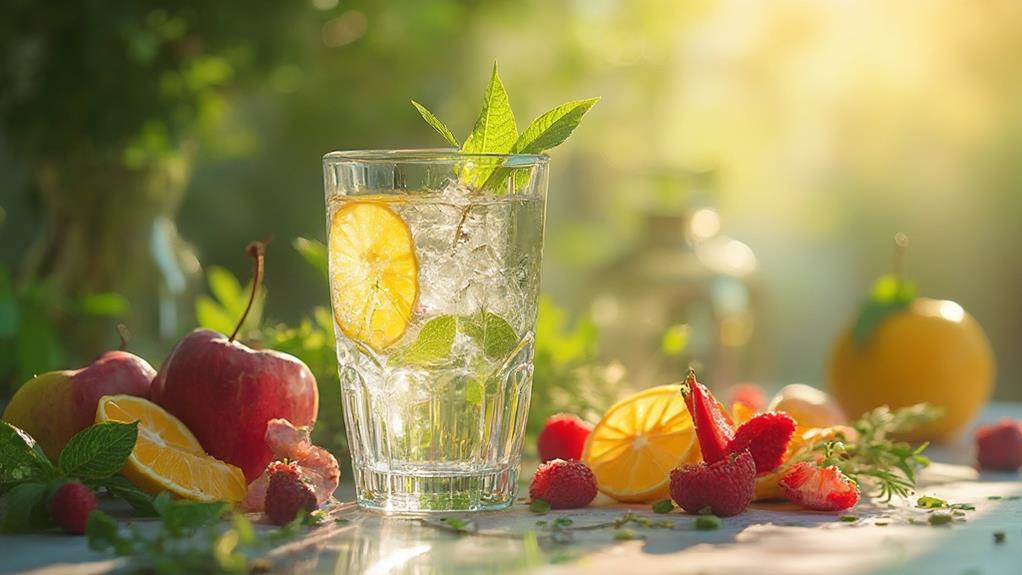
Maintaining Mental Clarity through Hydration
Staying hydrated is crucial for maintaining mental clarity, as it directly affects brain function. When the brain is well-hydrated, it operates at its best, enabling clear thinking and informed decision-making. Dehydration, on the other hand, can lead to fatigue, confusion, and decreased focus.
Improved Concentration
Drinking enough water helps improve focus and attention, making it easier to absorb and retain information.
A hydrated brain can concentrate for longer periods, leading to better academic or professional performance.
Emotional Balance
Adequate hydration helps regulate emotions, reducing irritability and promoting a more positive outlook.
When hydrated, individuals are better equipped to manage stress and anxiety, leading to improved mental well-being.
Optimal Cognitive Function
Even mild dehydration can impair cognitive functions like memory and attention.
Staying hydrated ensures the brain can process information efficiently.
Proper hydration enables individuals to think critically and make sound judgments, leading to better problem-solving skills.
Hydration Myths Debunked
Hydration Needs Vary
The idea that you need to drink eight glasses of water a day is a myth. In reality, the Institute of Medicine recommends a total fluid intake of about 3.7 liters for men and 2.7 liters for women, which takes into account individual factors like activity level, climate, and health.
All Fluids Contribute to Hydration
Another misconception is that only water counts toward your hydration. Beverages like herbal tea, milk, and even certain fruits and vegetables contribute to your overall fluid intake. For example, a cup of milk or a slice of watermelon can contribute to your daily hydration goals.
Drink Water Consistently
Some people believe that you shouldn't drink water when you're not thirsty. However, thirst isn't always a reliable indicator of hydration status, especially in older adults.
It's beneficial to drink water consistently throughout the day, even if you don't feel thirsty, to maintain proper hydration.
Caffeinated Drinks Are Not Dehydrating
The myth that caffeinated drinks are dehydrating is just that – a myth.
While caffeine does have a mild diuretic effect, studies show that moderate consumption doesn't significantly affect hydration levels. You can enjoy your morning coffee or tea without worrying about dehydration.
Tips for Staying Hydrated
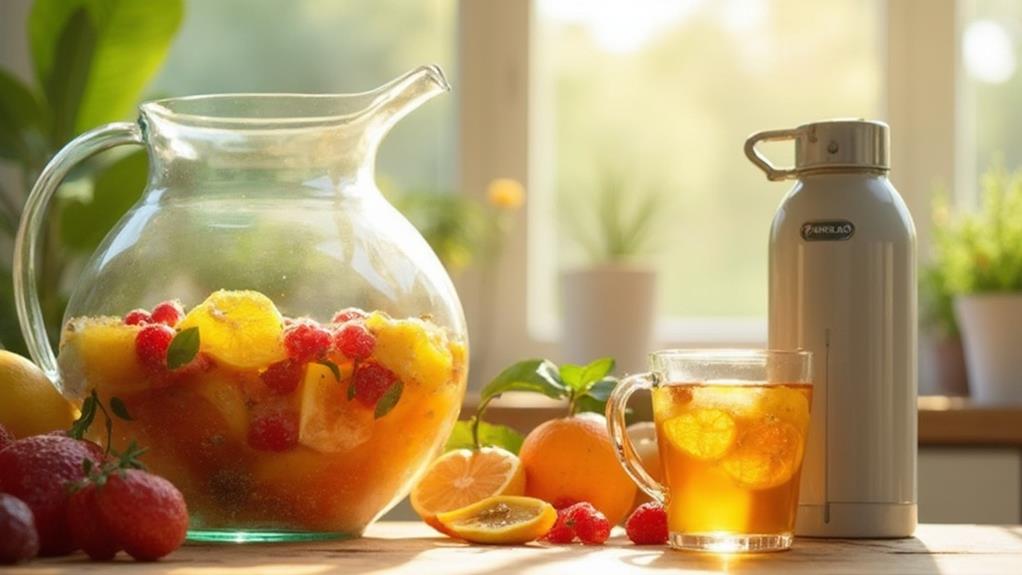
Staying Hydrated is Crucial for Overall Health
To maintain optimal hydration levels, incorporate these practical tips into your daily routine:
1. Carry a Reusable Water Bottle
Having a water bottle with you encourages regular sipping throughout the day.
Aim to refill it at least 3-4 times, depending on your activity level. This habit helps you drink enough water consistently.
2. Infuse Your Water
If plain water doesn't excite you, try adding slices of fruits, herbs, or vegetables. This not only enhances flavor but also provides additional nutrients.
For example, lemon, cucumber, or mint can be great options.
3. Set Reminders
Use your phone or smart devices to set hourly reminders to drink water. This simple technique helps establish a habit, ensuring you're consistently hydrating throughout the day.
